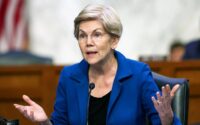China Likely to Ramp Up Monetary, Fiscal Stimulus, Survey Shows
(Bloomberg) — China is expected to cut interest rates again this year and ramp up fiscal stimulus to spur a faltering economy, according to economists surveyed by Bloomberg.
Most Read from Bloomberg
The People’s Bank of China will likely reduce the rate on its one-year policy loans — known as the medium-term lending facility — by 5 basis points to 2.6% in the final quarter of this year, according to the median estimate in the latest quarterly survey. It’s also expected to reduce the reserve requirement ratio for banks in the coming months, the forecasts show.
On the fiscal side, economists predict the government will roll out tax breaks for consumers and increase financing for infrastructure investment, partly through state policy banks, like China Development Bank.
Beijing is under mounting pressure to boost the economy after a marked slowdown in the second quarter led by a weakening property market, subdued consumer spending and a slump in export demand. The central bank’s surprise interest-rate cut in June fueled speculation of more stimulus, although the State Council, China’s cabinet, has been slow to announce any new measures.
Brian Lee, an economist at Maybank Securities Ltd., said the PBOC may wait until late in the third quarter or the final three months of the year before reducing rates further, given Beijing’s relatively conservative growth target of around 5% and worries over the currency.
“Cutting interest rates too quickly while the Federal Reserve and other global central banks hike could risk further capital outflows,” he said.
The yuan has already lost more than 4% against the dollar this year, with officials showing more concern recently about its slide.
The PBOC on Tuesday set the daily reference rate for the yuan far stronger than analysts had estimated following a plunge in the currency the day before. Wednesday’s fixing matched estimates as the central bank stood back from supporting the yuan, signaling it may not yet be ready to draw a line in the sand.
Investors have turned more pessimistic about China’s growth outlook after a slew of recent data showed the economy is weakening. Consumer spending, in particular, is showing a downturn, with domestic travel expenditure over last week’s holiday to celebrate the dragon-boat festival coming in lower than pre-pandemic levels.
Economists surveyed by Bloomberg downgraded their forecasts for gross domestic product growth for the second quarter, although kept their projections for the full year unchanged at 5.5%.
“Although strong first-quarter GDP and activity data confirmed the reopening rebound in services and consumption, the activity data for April and May were on balance underwhelming, and show that headwinds from the global growth slowdown and property remain serious,” said Arjen van Dijkhuizen, a senior economist at ABN Amro.
He predicted “piecemeal monetary easing and more targeted support directed at weak spots, including real estate.”
Of 20 economists surveyed by Bloomberg, 18 said the government will announce more fiscal support measures this year. Twelve of them expect tax cuts or rebates for small businesses, technology firms and for green projects, while 10 predict state policy banks will increase loans or equity investment in infrastructure projects. Nine forecast an increase in the quota for local government special bonds.
“Given the financial challenges at the local government and corporate level, the central government may accelerate special local government bond issuance and resume policy banks’ special infrastructure investment fund, with more policy bank lending, to help boost infrastructure investment,” Tao Wang, UBS Group AG’s chief China economist, wrote in a note.
Key Highlights of the Survey
-
GDP to expand 0.8% quarter-on-quarter in the second quarter, down from 1.1% in the previous survey. On a year-on-year basis, GDP to grow 7.5% compared with previous survey estimate of 7.7%. Full-year GDP forecasts for this year and next left unchanged at 5.5% and 4.9%, respectively
-
PBOC expected to cut the one-year medium-term lending facilities rate by 5 basis points to 2.6% in the last quarter of this year
-
Seven-day reverse repurchase rate likely to be reduced by 10 basis points in the final quarter, according to the survey
-
Consumer-price inflation to average 1.2% this year, down from previous survey estimate of 1.7%. Producer prices to contract 2.1% for the full year, compared with 1.4% decline in prior survey
-
Exports likely to decline 1.3% in 2023, compared with previous survey projection of growth of 0.7% growth
Most Read from Bloomberg Businessweek
©2023 Bloomberg L.P.
[ad_2]
Source link


